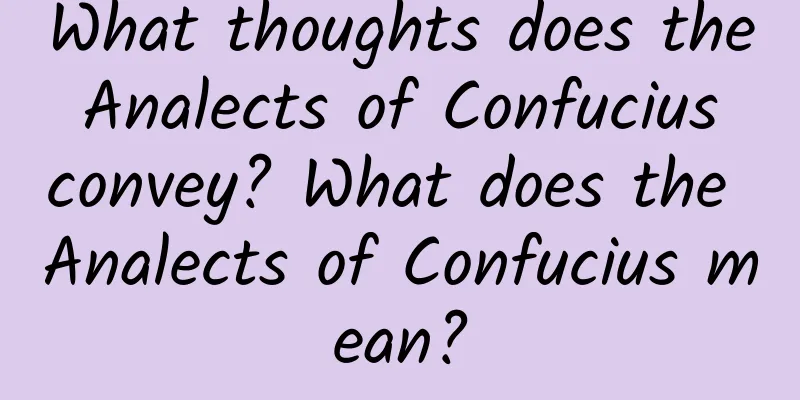What thoughts does the Analects of Confucius convey? What does the Analects of Confucius mean?

|
The Analects is a collection of prose in the form of quotations, mainly recording the words and deeds of Confucius and his disciples in the form of quotations and dialogues, which concentrates on Confucius' political, aesthetic, moral ethics and utilitarian values. So, what thoughts does the Analects convey about Confucius? What does the Analects mean when the mourning is over and the sorrow is over? Let's take a look at the introduction of Encyclopedia Knowledge Network to answer these questions! Contents of this article 1. What thoughts did the Analects convey? 2. What does "sorrow leads to sorrow and stops" mean in the Analects? 3. Classic sentences in the Analects 1What thoughts does the Analects convey?The Analects is an important work of the Confucian school. It records the words and deeds of Confucius and his disciples in the form of quotations, and often conveys Confucius' political thoughts, ethical concepts, life insights and insights into education in just a few words. The core of Confucius' thought recorded in the Analects is benevolence. "If a man has no benevolence, what is the use of ritual? If a man has no benevolence, what is the use of music?" The concept of benevolence is based on the love that is different between the elders and the young, the noble and the humble, and the relatives and the strangers in the family. This love is embodied in the moral etiquette of filial piety, loyalty and trustworthiness, and the order of the ruler-ruler, the minister-minister, the father-father, and the son-son. In politics, Confucius believed that the people were the most important, followed by the social order, and the king was the least important. He first had to make the people prosperous and gain their trust. He also emphasized that one must first rectify one's name before doing things. If the name is not righteous, then the words will not flow smoothly; if the words are not flowing smoothly, then things will not be accomplished; if things are not accomplished, then rituals and music will not flourish; if rituals and music do not flourish, then punishments will not be appropriate; if punishments are not appropriate, then the people will be at a loss. The Analects also records Confucius' attitude and methods towards education and learning, such as "When three people walk together, there must be one who can be my teacher", "There is no distinction in teaching", "When I know, I know; when I don't know, I don't know", "If you study without thinking, you will be in vain; if you think without studying, you will be in danger", etc. 2What does "sorrow leads to sorrow and ends" mean in the Analects?Meaning: It means that Ziyou said: "In mourning, it is enough to fully express grief." It emphasizes that mourning must be moderate. "丧致乎" sentence: This sentence contains two meanings: one is that in mourning, there is still grief, but no complicated rituals and decorations. The other is that since you have mourned, you should stop, and not mourn too much to the point of destroying your body and soul. "丧" refers to the period of mourning for a direct relative. 3Classic sentences from the Analects1. Zengzi said: A scholar must be broad-minded and resolute, for the responsibility is heavy and the road is long. Is it not a heavy responsibility to take benevolence as one's own responsibility? Is it not a long way to go until death? 2. Confucius said: Do not look at what is not proper, do not listen to what is not proper, do not say what is not proper, and do not do what is not proper. 3. Confucius said: "Is it not a pleasure to learn and practice what one has learned? Is it not a pleasure to have friends coming from afar? Is it not a gentleman to not be angry when people do not know you?" 4. Confucius said: I have tried not to eat or sleep all day long in order to think, but it is of no use. It is better to study. 5. Confucius said: When you see a virtuous person, you should aspire to be like him; when you see an unvirtuous person, you should reflect on yourself. |
<<: When was the Analects written? How many characters are there in the Analects?
>>: How do you evaluate the Analects? What do the two words "lun" and "yu" in the Analects mean?
Recommend
How long does it take for menstruation to come?
Menstruation is a normal physiological reaction t...
Enterbrain: Japan's social game market size reached $1.45 billion in 2010
A recent report released by Tokyo magazine publis...
Can I drink apple cider vinegar during my period?
Apple cider vinegar has gained popularity in rece...
What causes tailbone pain in pregnant women?
For women, after marriage, having children become...
What causes lower abdominal pain and missed menstruation?
A woman’s first menstruation indicates that she h...
[Medical Q&A] Will the degree of astigmatism in adults continue to increase?
Author: Wang Mengyu: The Sixth People's Hospi...
What causes pelvic effusion during pregnancy?
Women have weaker immunity during pregnancy, and ...
Seriously, what time does it take to go to bed to be considered staying up late?
Reviewer of this article: Chen Haixu, Deputy Dire...
Does vaginal ultrasound during pregnancy have any effect on the baby?
There is a test called transvaginal ultrasound, w...
What does anterior uterus enlargement mean?
Anterior uterus is a normal body position and usu...
What to do if progesterone is low and menstruation does not come
If the progesterone level in a woman's body i...
Can eyes be treated in summer? This kind of eye disease should be treated while it is hot!
In most people's minds, crying is a physiolog...
Can girls donate blood during menstruation?
Can girls donate blood during their menstrual per...
When does B-ultrasound monitoring of ovulation begin?
If a woman wants to get pregnant, she needs to ac...
Why does practicing Ba Duan Jin cause farting? Why does practicing Ba Duan Jin cause burping?
Ba Duan Jin is an independent and complete set of...









